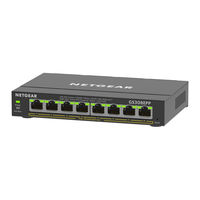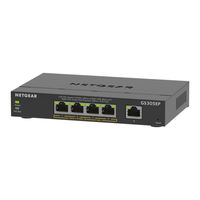User Manuals: NETGEAR GS308EPP Gigabit Ethernet Switch
Manuals and User Guides for NETGEAR GS308EPP Gigabit Ethernet Switch. We have 4 NETGEAR GS308EPP Gigabit Ethernet Switch manuals available for free PDF download: User Manual, Installation Manual
Advertisement
NETGEAR GS308EPP User Manual (98 pages)
Gigabit Ethernet PoE+ Easy Smart Managed Switches
Table of Contents
NETGEAR GS308EPP User Manual (94 pages)
Gigabit Ethernet Smart Managed Plus Switches
Table of Contents
Advertisement
NETGEAR GS308EPP Installation Manual (7 pages)
8-Port Gigabit Ethernet PoE+ Easy Smart Managed Essentials Switches



